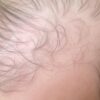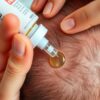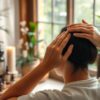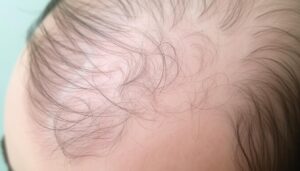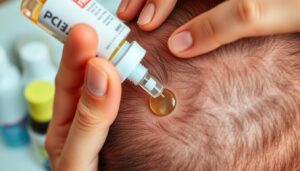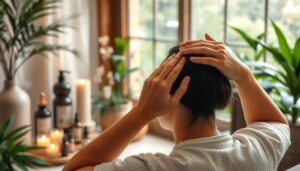Are you worried about Nexplanon and hair loss? Many women using this birth control have noticed more hair shedding or thinning. We’ll look into the science, find out why, and offer ways to deal with it.
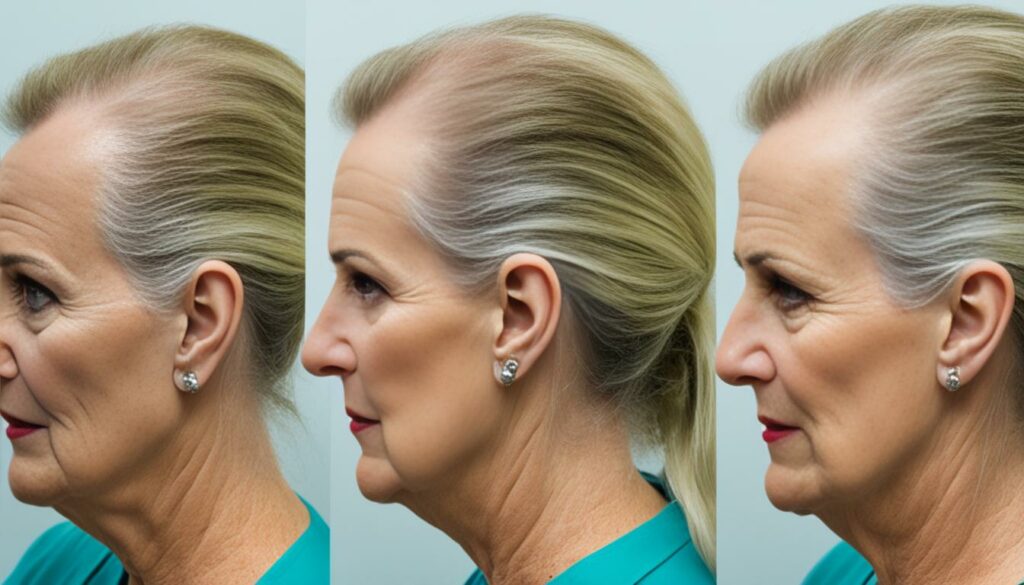
Key Takeaways
- Nexplanon, a popular contraceptive implant, has been associated with hair loss in some users.
- The connection between Nexplanon and hair shedding is related to hormonal changes and their impact on the hair growth cycle.
- Understanding the potential causes of hair loss can help you take proactive steps to minimize the issue.
- Effective strategies for managing hair loss while using Nexplanon include adjusting hair care routines and seeking medical advice if the problem persists.
What is Nexplanon?
Nexplanon is a new kind of birth control implant. It’s a small, flexible rod placed under the skin in your upper arm. This implant can protect you from pregnancy for up to 5 years. It works by slowly releasing a hormone that prevents pregnancy with a success rate of less than 1% when used correctly.
Understanding the Nexplanon Contraceptive Implant
The Nexplanon implant is a discreet and easy-to-use birth control method. It’s only 4 centimeters long and is put in during a quick visit to the doctor. It can stay in for up to 5 years. After it’s in, the implant slowly releases a hormone that stops ovulation and makes cervical mucus thicker.
How Nexplanon Works and Its Efficacy
Nexplanon works by releasing a hormone that stops the body from ovulating. This hormone also makes cervical mucus thicker, so sperm can’t reach the egg. These actions together make Nexplanon over 99% effective at preventing pregnancy.
| Nexplanon Efficacy | Details |
|---|---|
| Typical Use Failure Rate | Less than 1% |
| Perfect Use Failure Rate | Less than 0.1% |
| Duration of Use | Up to 5 years |
Nexplanon is a reliable and easy-to-use birth control option. It offers long-lasting protection with a low failure rate. Its design and continuous hormone release make it a top choice for those looking for a dependable and easy birth control method.
Does Nexplanon Cause Hair Loss?
Many people worry about Nexplanon causing hair loss or more hair shedding. The exact link between Nexplanon and hair loss is still being studied. But, the hormonal changes from this birth control method might lead to hair issues in some women.
Exploring the Link Between Nexplanon and Hair Shedding
The Nexplanon implant releases a steady dose of the hormone etonogestrel. This hormone helps prevent pregnancy. But, it can also affect the normal hair growth cycle. This might cause more hair follicles to enter the resting phase. So, some women might see increased hair loss or shedding while using Nexplanon.
Not all Nexplanon users will experience hair loss. The amount of hair shedding can differ. It depends on things like your genes, health, and how your body reacts to the hormonal changes.
| Condition | Prevalence |
|---|---|
| Hair loss with Nexplanon | Approximately 5-10% of Nexplanon users* |
| No significant hair loss with Nexplanon | Majority of Nexplanon users* |
*Figures are approximate and may vary based on individual experiences and studies.
“While Nexplanon can contribute to hair shedding in some women, it’s not a universal experience. It’s important to be aware of the potential side effects and monitor your hair health closely if you’re using this contraceptive method.”
Causes of Hair Loss with Nexplanon
The main reason for hair loss with Nexplanon is the hormonal changes it causes. Nexplanon uses progestin, a synthetic hormone, which can disrupt the normal hair growth cycle. This leads to more hair follicles resting and shedding, resulting in hair loss nexplanon.
Some women are more sensitive to these hormonal changes. This sensitivity can make them more likely to experience nexplanon hair loss. Everyone’s body reacts differently to the progestin in Nexplanon.
Other factors like nutritional deficiencies and stress can also cause reasons for hair loss with nexplanon. Not getting enough vitamins and minerals is bad for hair health. Stress can also mess with the hair growth cycle, making more hair fall out.
| Potential Causes of Hair Loss with Nexplanon | Description |
|---|---|
| Hormonal changes | The progestin in Nexplanon can affect the hair growth cycle, leading to increased shedding. |
| Individual sensitivity | Some women may be more sensitive to the hormonal changes caused by Nexplanon, resulting in hair loss. |
| Nutritional deficiencies | A lack of essential vitamins and minerals needed for healthy hair growth can contribute to hair loss. |
| Stress | High levels of stress can disrupt the normal hair growth cycle and lead to increased shedding. |
Knowing the causes of hair loss with nexplanon is key to dealing with it. By understanding these factors, women using Nexplanon can take steps to reduce hair shedding. This helps keep their hair healthy and looking good.
Managing Hair Loss While Using Nexplanon
If you’re using Nexplanon and losing hair, there are ways to handle it. Nexplanon can cause some hair shedding, but you can lessen its effects. By taking the right steps, you can keep your hair healthy and looking good.
Tips for Managing Hair Loss with Nexplanon
- Avoid excessive hairstyling: Use heat tools less often and avoid tight hairstyles and frequent coloring or perming. These can stress your hair and make shedding worse.
- Maintain a healthy, balanced diet: Make sure you get enough protein, iron, and other nutrients for healthy hair. Eat foods like lean proteins, leafy greens, and omega-3-rich fish.
- Consult a healthcare provider: If hair loss doesn’t stop or is severe, talk to a healthcare provider or dermatologist. They can find out why and help you with a treatment plan.
By following these tips, you can lessen the effects of hair loss with Nexplanon. Remember, hair loss with Nexplanon is usually temporary. With the right steps, you can deal with it and keep feeling confident.
Lifestyle Factors Affecting Hair Loss
The hormonal changes from Nexplanon can cause hair loss, but your lifestyle also plays a big part. Knowing how your daily habits affect your hair is key to managing hair loss with Nexplanon.
Stress and Hair Loss
Stress can mess with the normal hair growth cycle, making you shed more hair. It releases cortisol, a hormone that can mess with hair growth hormones. To fight this, try meditation, yoga, or regular exercise to reduce stress.
Nutritional Deficiencies and Hair Loss
Eating a balanced diet full of vitamins, minerals, and proteins is crucial for healthy hair. Not getting enough iron, zinc, biotin, or vitamin D can lead to hair loss. If you think you’re not getting the right nutrients, talk to a healthcare expert about supplements.
| Lifestyle Factor | Impact on Hair Loss with Nexplanon |
|---|---|
| Stress | Elevated cortisol levels can disrupt the hair growth cycle, leading to increased shedding. |
| Nutrition | Nutrient deficiencies, particularly in vitamins and minerals essential for hair health, can contribute to hair loss. |
| Hair Care Practices | Harsh styling, excessive heat, and chemical treatments can damage the hair and follicles, exacerbating hair shedding. |
| Underlying Conditions | Medical issues like thyroid disorders, anemia, or autoimmune diseases may manifest as hair loss. |
Nexplanon and Hair Loss: Solutions You Can Consider
If you suffered from hair loss while using Nexplanon, it’s important to know that there are solutions that can help you restore the lush, full look of your hair. Scalp micropigmentation is the only hair loss treatment option that can provide you with guaranteed customized results — without the side effects of prescription medication or the recovery associated with hair transplant surgery. Scalp micropigmentation is a non-surgical procedure in which a licensed technician deposits pigment into your scalp, adding density to your hair and restoring your previous look. This procedure can be completely customized to meet your needs.
Choosing the Right Scalp Micropigmentation Provider
If you are dealing with Nexplanon and hair loss, you may find that scalp micropigmentation from ScalpMasters is the best treatment option for you. By relying on skill and precision, an experienced technician can use scalp micropigmentation to add density to your hair. It is important to partner with a trusted provider who has been performing scalp micropigmentation for years, and who has trained with the leading experts in the industry. Contact us for a free consultation today!
FAQs
Many people wonder about Nexplanon and hair loss. Let’s explore some common questions to help you understand this topic better.
Can Nexplanon Cause Permanent Hair Loss?
No, Nexplanon doesn’t usually lead to permanent hair loss. The hair loss it causes is often temporary and goes away. After the Nexplanon effects wear off, hair growth should return, and shedding stops.
How Long Does Hair Loss Last After Removing Nexplanon?
Hair loss might last for several months after Nexplanon removal. The hormonal changes from the implant affect hair growth cycles. But, most women see their hair go back to normal in a few months.
Does Everyone Experience Hair Loss with Nexplanon?
No, not all Nexplanon users will see hair loss. How people react to hormonal changes varies. The amount and length of hair loss depend on your hormonal balance, genes, and hair health.



